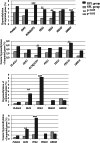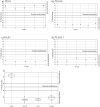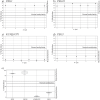NLRP7 variants in spontaneous abortions with multilocus imprinting disturbances from women with recurrent pregnancy loss
- PMID: 34554362
- PMCID: PMC8608992
- DOI: 10.1007/s10815-021-02312-z
NLRP7 variants in spontaneous abortions with multilocus imprinting disturbances from women with recurrent pregnancy loss
Abstract
Purpose: Comparative analysis of multilocus imprinting disturbances (MLIDs) in miscarriages from women with sporadic (SPL) and recurrent pregnancy loss (RPL) and identification of variants in the imprinting control gene NLRP7 that may lead to MLIDs.
Methods: Chorionic cytotrophoblast and extraembryonic mesoderm samples from first-trimester miscarriages were evaluated in 120 women with RPL and 134 women with SPL; 100 induced abortions were analyzed as a control group. All miscarriages had a normal karyotype. Epimutations in 7 imprinted genes were detected using methyl-specific PCR and confirmed with DNA pyrosequencing. Sequencing of all 13 exons and adjusted intron regions of the NLRP7 gene was performed.
Results: Epimutations in imprinted genes were more frequently detected (p < 0.01) in the placental tissues of miscarriages from women with RPL (7.1%) than in those of women with SPL (2.7%). The predominant epimutation was postzygotic hypomethylation of maternal alleles of imprinted genes (RPL, 5.0%; SPL, 2.1%; p < 0.01). The frequency of MLID was higher among miscarriages from women with RPL than among miscarriages from women with SPL (1.7% and 0.4%, respectively, p < 0.01). Variants in NLRP7 were detected only in miscarriages from women with RPL. An analysis of the parental origin of NLRP7 variants revealed heterozygous carriers in families with RPL who exhibited spontaneous abortions with MLIDs and compound heterozygosity for NLRP7 variants.
Conclusion: RPL is associated with NLRP7 variants that lead to germinal and postzygotic MLIDs that are incompatible with normal embryo development.
Trial registration: Not applicable.
Keywords: DNA methylation; Multilocus imprinting disturbances (MLID); NLRP7; Placenta; Recurrent pregnancy loss; Trophoblast.
© 2021. The Author(s), under exclusive licence to Springer Science+Business Media, LLC, part of Springer Nature.
Conflict of interest statement
The authors declare that they have no conflicts of interest that could be perceived as prejudicing the impartiality of this manuscript.
Figures





References
-
- Practice Committee of the American Society for Reproductive Medicine. Definitions of infertility and recurrent pregnancy loss: a committee opinion. Fertil Steril. 2020;113:533–5. 10.1016/j.fertnstert.2019.11.025 - PubMed
MeSH terms
Substances
Grants and funding
LinkOut - more resources
Full Text Sources

